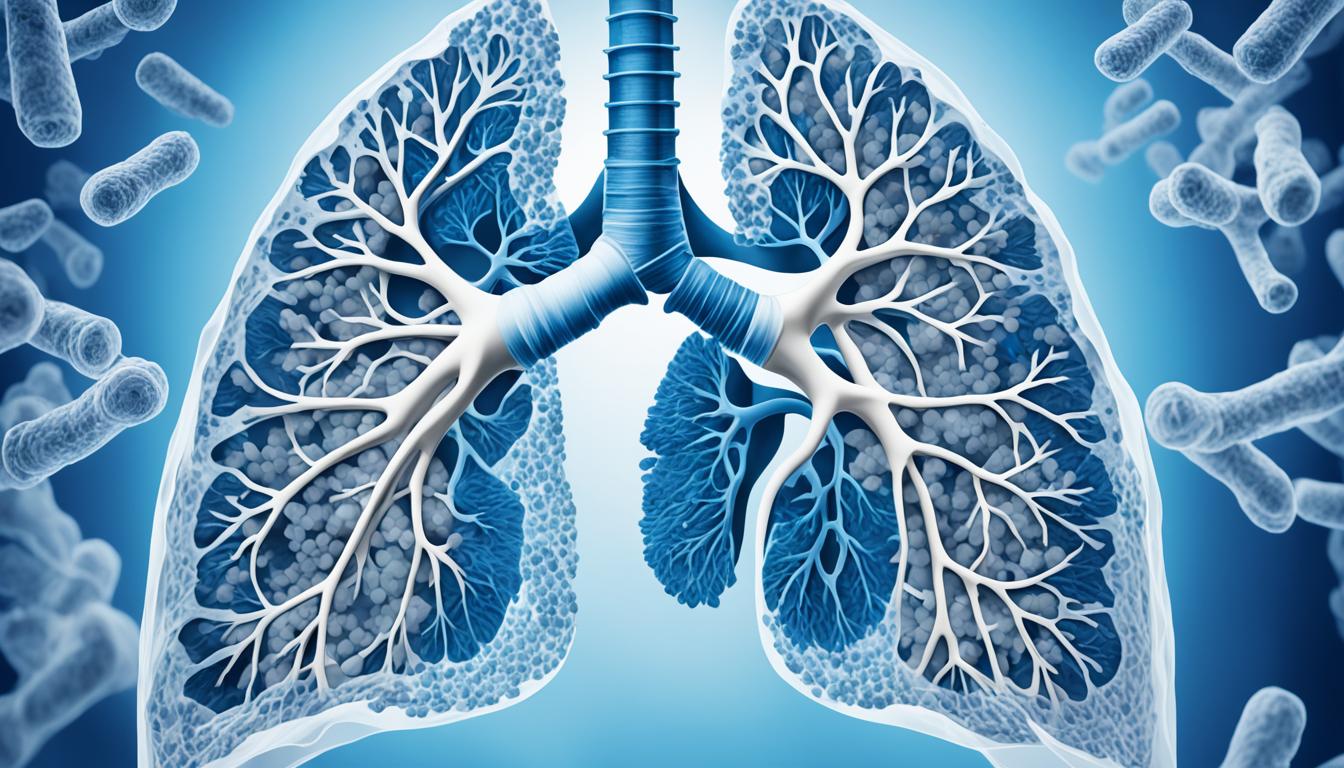Emphysema is a long-term lung disease under COPD. It damages the alveoli, small air sacs. These sacs help with oxygen and carbon dioxide exchange.
The disease’s key signs are gasping for air, a tough cough, and being tired. Smoking causes about 14% of cases in men and 3% in non-smokers.
Unfortunately, there is no full cure for emphysema. But, treatments can help control signs and make life better. Treatments include drugs, rehab to strengthen lungs, and extra oxygen.
Key Takeaways:
- Emphysema is a chronic lung condition that falls under COPD.
- The main symptoms of emphysema include shortness of breath, coughing, and fatigue.
- Smoking is a major contributor to emphysema.
- Treatment options for emphysema include medications, pulmonary rehabilitation, and oxygen therapy.
- Stem cell therapy shows promise in improving the quality of life for patients with emphysema.
Causes and Diagnosis of Emphysema
Emphysema is a long-term lung issue. It makes it hard to breathe because it damages your lung walls. Knowing what causes emphysema and finding it early can help with treatment.
Causes:
Smoking is the biggest reason people get emphysema. If you smoke yourself or breathe in smoke from others, you’re at risk. Genetic issues, like lacking alpha-1 antitrypsin, can also make emphysema more likely. Plus, breathing in bad air outside, working with dust or chemicals, and living or working where the air is dirty can cause it, as can indoor pollutants and getting lung infections a lot.
Diagnosis:
To find out if you have emphysema, doctors do several tests. They check your lung function with a spirometry test and look for any damage with a chest X-ray or a special lung scan. These tests show how well your lungs work and how much they’re hurt.
Doctors also check your blood to see if you’re getting enough oxygen and getting rid of carbon dioxide properly. Screening for alpha-1 antitrypsin deficiency with a blood test can be important. Sometimes, they’ll do other checks, like looking at what comes up when you cough, or heart tests, to better understand your health.
To sum up, smoking and certain genes can cause emphysema. Bad air and other factors play a part too. Tests like pulmonary function checks and lung scans are key to figuring out if you have it and how bad it is.
| Causes of Emphysema | Description |
|---|---|
| Smoking | Active smoking and exposure to passive smoking are the primary causes of emphysema. |
| Alpha-1 Antitrypsin Deficiency | A genetic condition that increases the risk of developing emphysema. |
| Environmental Factors | Long-term exposure to outdoor air pollutants, occupational exposure to dust and chemical fumes, poor ventilation, indoor pollutants, and frequent respiratory infections can contribute to emphysema. |
Treatment Options for Emphysema, Including Stem Cell Therapy
The treatment for emphysema mixes together lifestyle changes and medicines. It might also need surgeries. Drugs often include bronchodilators to open airways and inhaled steroids. These lower lung inflammation. Doctors might also give antibiotics to fight infections.
Vaccines are key for those with emphysema. They should get the flu shot every year. Pneumococcal vaccine is also crucial. It guards against severe respiratory infections. People with a specific genetic issue might need Alpha-1 Antitrypsin therapy. This treats their deficiency, lowering emphysema risks.
Pulmonary rehab is vital for emphysema care. It helps patients get stronger and breathe better. The program includes exercises, breathing lessons, and education. This boosts lung function and life quality.
Oxygen therapy is crucial for emphysema cases with low blood oxygen. It eases breathing, making daily life simpler. This therapy helps improve a patient’s health overall.
In very severe emphysema, surgeries like lung volume reduction or transplants might be options. Lung volume reduction surgery removes damaged tissues. This lets healthier parts work better. A lung transplant might replace a very damaged lung with a healthy one.
Stem cell therapy is becoming a hopeful treatment for emphysema. It aims to fix damaged lung tissues. Studies show it helps COPD patients significantly. While its cost varies, it might be a good alternative treatment to consider.

